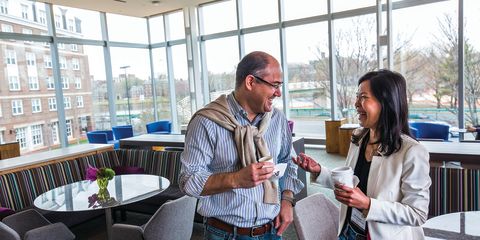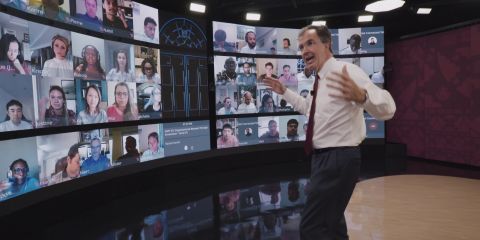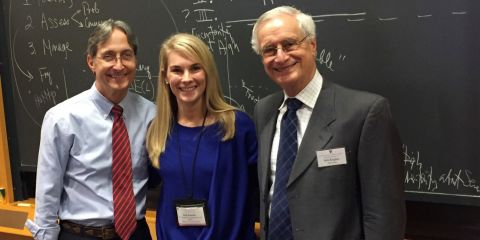This article originally appeared in the Harvard Business School—Newsroom.

Can you tell us a bit about the new role and what it means organizationally for HBS Online and Executive Education?
Patrick Mullane (PM) (Executive Director, HBS Online and Executive Education): The role includes management of both organizations. The easiest way to explain it is that the non-degree programs on campus fall under our purview. At about the time the leadership role in ExecEd opened up, there were conversations happening at HBS about online and in-person programming moving from purely stand-alone offerings to, in some cases anyway, components of integrated blended offerings. It made sense to think of it all as a unified whole rather than two separate lines of business.
Luis Viceira (LV) (Senior Associate Dean, HBS online and Executive Education): We all agree that these are distinct brands—the market sees that, too—but that shouldn't prevent the two organizations from working together towards better products. This is especially important in a world of blended learning, an area where we’ve already seen some huge success. There is much more we can do, but that's only possible when the two organizations are working together well. That's the objective. This is not about restructuring; it's about getting the two organizations integrated.
So HBS Online and Executive Education will maintain their own organizational structures?
(PM): While the brands will remain separate, as opportunities arise, the organizational structures will likely morph and become more integrated, but not in some single, huge change and not in all areas. We will also look to be opportunistic. For example, when the tech lead for ExecEd left, we asked the person who ran the tech side of Online to take on ExecEd responsibilities as well.
(LV): The two products need autonomy. ExecEd doesn't have the experience that the HBS Online team has in producing purely online asynchronous programs, and that's an expertise we need to preserve—they've developed it over the years and it's the best on the market. Likewise, the creation and delivery of ExecEd programs takes different skills and structures than those necessary to create and deliver asynchronous online programs. Those skills and structures have been developed over decades. We need to make sure that within functions there is some autonomy to decide how best to meet participant needs. At the same time, we want to be more deliberate about identifying when the product types can come together.
What are examples of products coming together?
(PM): I don't think the community knows that the alumni-granting programs in ExecEd, the Comprehensive Leadership Programs, use HBS Online asynchronous content as part of the curriculum for participants before they ever show up on campus. When they arrive at HBS or join a synchronous distance learning experience (for example, through the Live Online Classrooms) they are better prepared to dive into case discussions. That's what we mean by blended learning.
(LV): The ideal program is like that—asynchronous learning along with case discussions in the Live Online Classroom, often before arriving on campus. When participants do land on campus, they are eager to shake the hands of those they've already connected with online and they know how to engage in the case discussions. This makes their experience on campus that much better. There can also be follow up when they leave, with extended content in the Live Online Classroom. It's very distinctive; there’s no other school doing this.
What excites you most about the potential of this union?
(PM): First, having multi-modal ways of delivering learning when corporations come to the School asking to educate their managers or leaders in a specific topic—we're the only school in the world that has the breadth and quality of offerings all in one place. I think we're just scratching the surface of what we can do there. In the past, only the more senior people from an organization could come to ExecEd programs on campus. But they may want everyone in the organization to understand what their CEO and C-suite leadership team has learned so that there's alignment at all levels. We can now meet that need with online programming.
Second, how do we create programs that meet the needs of the full spectrum of individuals—how do we blend all our products together to have effective learning and meet each person where they are? How do we satisfy those who want to come to campus, those who don't, and those in the middle? We need to figure out what that middle looks like. We've got the online figured out, the in-person figured out, and we are doing some blending, but there’s a lot of room to figure out exactly what it's going to look like. We also think that different program designs in that middle ground may help us reach more diverse populations of learners.
(LV): We are in the process of exploring how we can more easily develop short form content—right now, our offerings are more like a novel with an integrated narrative thread through them. The question is, can we do chapters that stand alone? There's a lot of excitement around doing that, and it will help a lot with blended learning. We're uniquely positioned to deliver true blended learning.
What are you focusing on day-to-day?
(PM): It's a bit of the Hippocratic oath of "First do no harm," because nothing is fundamentally flawed in any way. ExecEd was hugely successful long before me, and Online is a great team doing great stuff. I'm learning the people and the operation on the ExecEd side and going through some internal strategic planning. In a year or two we'll hopefully be able to do joint strategic planning which will further drive a more integrated go-to-market strategy. Right now we're bolting things onto each other—we have an online program, an ExecEd program, and ways to connect the two. It would be nice to be more deliberate about it and have a purpose-built asynchronous program to match up with an in-person program. A few days a week, I'll meet with participants. I'm usually in the Chao dining area early each morning doing work and get to connect with those on campus for a program and hear what they do and don’t like. I'm also meeting with businesses to hear what they're looking for so that we can better shape that over time. Finally, I've been meeting with a lot of staff and faculty—often informally—just to hear what’s on their minds. I'm big on culture and I want to be sure we do our best to foster a culture where all can be their best.
I often say that HBS is a battleship, not a speed boat—anything we do takes a lot of planning and steering. But we're going to have to figure out a way to do quick innovative experiments in both the online and in-person realms to learn what we don't know.
(LV): The experimentation part is very important. We learned that during the pandemic, when our willingness to experiment allowed the School to offer 65 programs when most other places were closed or doing all Zoom. That kind of experimentation was extraordinary.
What do you most want the community to know about this new partnership?
(PM): I think a lot of people don't appreciate that there are a lot of schools and companies out there trying to create new and compelling blended online programs and they’ve had a lot of difficulty doing it. I don't think we step back enough and say, "Holy cow, we really have done well in a market that's very, very tough." Yes, the brand matters, but we often don’t give ourselves enough credit for being the brand—we make the brand valuable by the things we do, and I think sometimes the broader community doesn't hear that enough. It's pretty amazing.
(LV): There's a lot of effort and experimentation towards bringing a more diverse population to HBS Online and ExecEd. We want to bring more appealing, important, and relevant content to a more diverse population. We have a few programs in development now that will try to do exactly this … stay tuned!








